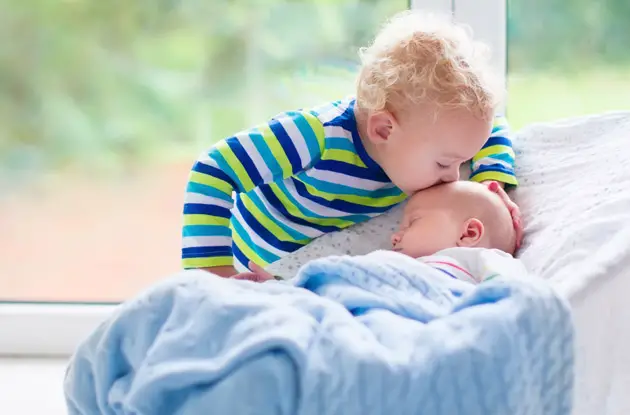
How to Prepare Your Child to Become a Big Brother or Big Sister
Pregnant again? Learn how to prepare your first-born for the baby on the way.
Get can’t-miss family activities sent to you!
Get the Best Kid-Friendly Activities
Sent to You Weekly!
Involve Your Older Kids in Getting Ready for Baby
Once you’ve shared the news, build on it with age-appropriate activities:
- Read books together about having a new sibling. Many favorite TV characters have siblings as well. Watch the show your child likes and talk about how those siblings interact.
- Give your child a baby doll and feed, change, and rock it together.
- Introduce your child to a friend or relative’s baby. The baby should be older than 3 months to reduce the risk of catching an illness from your child, and you should exercise caution if you let your child hold the baby.
- Share old photos of you and your siblings, and tell stories about what life was like growing up together. Don’t forget current photos. Fran L., a mother of two boys in Syosset, told 3½-year-old Ben about the baby on the way by surprising him with her sonogram photo.
- Allow your child to pick out clothes or toys for the new baby.
- Have your child participate in a sibling-preparation class at a local hospital.
- Enlist your first-born as an all-important “mommy’s helper,” Dr. Schuster suggests. “Tell your two-year-old that you will need her help letting you know when the baby is crying and figuring out what the baby needs. You can tell older children that you’ll need their help getting clean diapers ready and making the baby laugh by making silly faces.”
- When referring to the baby-to-be, use language such as “our baby” and “your baby sister/brother”—it suggests your child has a relationship with the baby and has an important role to play.
Helping Older Siblings Bond with Baby
To keep the sibling relationship growing after the baby arrives, do a few more things:
- Help your child choose a gift for the newborn. Give your first-born a gift the newborn “picked out” as well.
- Avoid introducing big changes in your older child’s routine while your baby is still settling in. That includes toilet training, going from a bottle to a sippy cup, and giving up the pacifier.
- Allow your child to help with the baby. Closely supervised older children can hold the baby while sitting, or can pass diapering or bathing supplies to the parent. Children of all ages can sing songs to a fussy newborn. (If your child doesn’t want to help, though, don’t force it. Encourage him to say hello and goodnight to his sibling and let the relationship blossom on its own.)
- Praise your first-born whenever she is behaving well.
- Have her spend time with other family members, such as grandparents, to deepen those relationships. Emphasize that you are one big happy family with enough love to go around.
Even if you do all of the above, there may be some bumps in the road. For one thing, expect a bit of regression—sliding backward on previously mastered skills is not unusual. Emma’s daughter Ella, who had been toilet-trained for five months, briefly went back to diapers after the birth of her little brother. The key, Dr. Trachtenberg says, is not to make a big deal of it.
A certain amount of jealousy and acting out may also be unavoidable. Stay the course with the strategies above, and remain positive—hugs, kisses, and kind words will go a long way. And be sure to have regular 1-on-1 time with your older child. Emma has a “girls’ lunch out” once a week with Ella.
Realize that for a child, no matter what his or her age, having a baby brother or sister enter the family is nowhere near as tumultuous as parents imagine it to be. “Most of the time it’s a smooth transition,” Dr. Trachtenberg says. “I’ve been in private practice twenty-two years and people always ask me when is the best time to have a second child. But whether the children are close in age or far apart, it’s super rare that there’s any ongoing jealousy. It will work out.”








